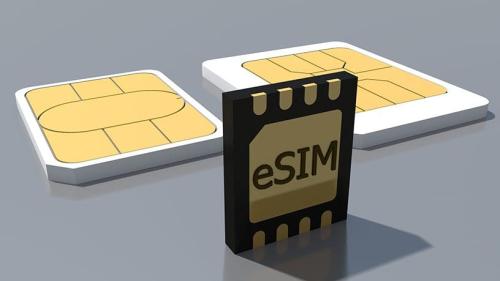With the growing number of devices that are compatible with the eSIM technology (embedded SIM), there is no doubt that the popularity of eSIM (embedded SIM) will continue to grow. With the rise of eSIMs over the past few years, there has been consistent and significant growth in the market. Compared to the traditional SIM card, this technology entails the integration of a SIM chip directly into the device, thereby eliminating the requirement for a physical SIM card, which is a major difference between the two. While you might be wondering whether your device supports eSIM technology or not, let’s take a look at which devices support this technology.
Listed below are the devices that are compatible with eSIM
1. The mobile phone
Due to the fact that they usually require a SIM to access their features, smartphones are among the devices that are compatible with SIM technology. Smartphones, not just smartphones, are the most recent generations of phones following the advent of eSIM. In other words, what are these phones?
The first is the iPhone
There are a number of iPhones that can be modified to support the technology. You can switch over to eSIM on some iPhones. As a result, you are able to use SMS if you use one of the following devices on your iPhone:
- iPhone XS
- iPhone XS Max
- iPhone XR
- iPhone 11, 11 Pro, and 11 Pro Max
- iPhone SE (2020)
- iPhone 12, 12 Pro, 12 Pro Max
- iPhone 13 mini, 13, 13 Pro, and 13 Pro Max
- iPhone SE (2022)
- iPhone 14, 14 Plus, 14 Pro, and 14 Pro Max
- iPhone 15, 15 Plus, 15 Pro, and 15 Pro Max
- iPhone 16
In the second place, we have Samsung phones.
In recent years, Samsung has developed the latest Android phones which are compatible with eSIM, so you can install an eSIM on an Android device that supports eSIM. Below is a list of the Samsung models that support and are compatible with the eSIM technology:
- Samsung S24
- Samsung Galaxy S23 and S23 Plus
- Samsung Galaxy S22, S22 Plus and S22 Ultra
- Samsung Galaxy S21, S21 Plus, and S21 Ultra
- Samsung Galaxy S20 and S20 Plus
- Samsung Galaxy Note 20 and Note 20 Ultra
- Samsung Galaxy Fold, Fold 2, Fold 3 and Fold 4
- Samsung Flip 1, 3 and 4
- Samsung Galaxy S20 Hybrid Dual SIM
- Samsung Galaxy A55 5G
- Samsung Galaxy Z Flip 6
- Samsung Galaxy Fold 6
In third place, we have Google Pixel phones
Some models of Google Pixel smartphones are able to support the eSIM technology, and they include the following:
- Google Pixel 2, 2 XL
- Google Pixel 3, 3 XL
- Google Pixel 3a, 3a XL
- Google Pixel 4, 4 XL
- Google Pixel 4a 5G
- Google Pixel 5a
- Google Pixel 6, 6 Pro and 6a
- Google Pixel 7 and 7 Pro
- Google Pixel 8 and 8 Pro
- Google Pixel 9
4: Sony Mobile Phones
There are some Sony phones that are compatible with eSIM technology and are manufactured by Sony:
- Sony Xperia 10 III Lite
- Sony Xperia 1 IV
- Sony Xperia 10 IV
- Sony Xperia 5 IV
- Sony Xperia 1 V
- Sony Xperia 10 V
- Sony Xperia Ace III
- Sony Xperia 1 VI
5. Phones made by Huawei
It is worth mentioning that these are phones produced by the Chinese tech company Huawei. So far, Huawei has been able to make the following phones compatible with SIM:
-
Huawei P40 and P40 Pro
-
Huawei P50 Pro
-
Huawei Mate 40 Pro
-
Huawei Mate Xs 2
-
Huawei Mate X2
-
Huawei P70, P70 Pro and P70 Art
6. Phones that are manufactured by Xiaomi
Among the Xiaomi devices that support this technology are:
-
Xiaomi 12T Pro
-
Xiaomi 13, 13 Lite, 13 Pro and 13T Pro
-
Xiaomi Redmi Note 11 Pro 5G (Japan Only)
-
Xiaomi 14 Series
7. Other types of phones
A number of other phones from different manufacturers are also capable of supporting eSIM cards, including:
-
Motorola Razr 2019 and 5G
-
Gemini PDA
-
Rakuten Mini, BigS, Big, Hand and Hand 5G
-
Surface Pro X
-
Honor Magic 4 Pro
-
Fairphone 4
-
Sharp Aquos Sense 6s and Aquos Wish
-
DOOGEE V30
-
Nuu Mobile X5
-
Oppo Find X3 Pro, Reno 5A, Find X5, Find X5 Pro, Find X3 Pro, Find X5, Find X5 Pro, A55s 5G, Reno 6 Pro 5G and Find N2 Flip
2. Devices such as laptops and tablets
The eSIM also has the capability of being compatible with laptops and tablets, as can be seen when the technology is set up on Apple’s MacBook. Hence, you can find a wide range of laptops that support the integration of these technologies. The following are some of these:
-
A selection of HP devices, including the Spectre Folio 13, Elite x2 G2 and G3, Envy x2, EliteBook G4, G5 Notebook PC, Probook G3, G4, G5, Zbook G4, G5, Studio G5, and mt32 Mobile Thin Client, are listed below.
-
Devices from Lenovo include the Yoga C630, Miix 630, Yoga 520, Yoga 720, ThinkPad X1 Titanium Yoga 2 in 1, ThinkPad X1 Carbon Generation 9, ThinkPad X1 Fold, ThinkPad X1 Nano, ThinkPad X12 Detachable, and ThinkPad Flex 5G.
-
Among the ACER products are Swift 3 and 7, TravelMate P2, Spin P4, and P6.
-
The following Dell devices are supported by Dell: Latitude 7210 2-in-1, 9410, 7310, 7410, 9510, 5410, 5411, and 5511.
-
Asus Devices: Asus Mini Transformer T103HAF, Asus NovaGo TP370QL, and Vivobook Flip TP401NA are some of the ASUS products.
-
Microsoft devices include the Surface Go, Surface Go 2, Pro X, Pro 5 LTE Advanced, Pro 7+, and Neo smartphones.
-
A list of Apple iPad Pro models includes the iPad Pro 11″ (1st, 2nd, 3rd, and 4th generations), iPad Pro 12.9″ (3rd, 4th, 5th, and 6th generations), iPad Air (3rd, 4th, and 5th generations), iPad (7th, 8th, and 9th generations), and iPad Mini (5th and 6th generations).
-
The Samsung Tablet S9 and its variations, the Samsung Galaxy Book 2 and 3, and the Samsung Galaxy Foldable are all examples of Samsung tablets.
3. The smartwatch
There is no doubt that smartwatches are the next big thing. In spite of the fact that some watches use SIM cards, you can find the latest series of watches, especially from Apple and Samsung, that support eSIM integration as well. The following are some of these:
-
eSIM capability can be found on Apple Watch versions 3 and later, as well as other Apple Watch models.
-
As of now, the latest Samsung Galaxy Watch models are supported by this technology, and a physical SIM card is not required.
4. The car’s entertainment system
It is becoming increasingly evident that the eSIM capability is transcending the functionality of communications as the automotive sector adopts the technology to integrate eSIM capabilities into the connected car system of the future. Among the benefits of this innovation are the ability to perform remote diagnostics, perform real-time navigation, and provide entertainment in the vehicle.
There are a number of devices that are compatible with the technology, including:
-
The BMW ConnectedDrive software offers drivers real-time information and a number of connected features to make their journeys easier.
-
Audi Connect is a connected entertainment system that gives drivers access to a number of connectivity features through their dashboards.
5. Internet of Things (IoT) Devices
In recent years, the adoption of eSIMs in IoT applications has gained momentum, especially in areas such as smart meters, asset tracking, and industrial equipment that is connected to the Internet of Things. As an example of the IoT devices that are compatible with eSIM technology, we have the following:
-
The Nest Hub Max is Google’s newest smart home device, which integrates eSIM technology for a seamless communication and control experience.
-
The Surface Pro X from Microsoft is one of the first laptops to have enabled the eSIM feature in terms of functionality.
Frequently Asked Questions (FAQs) About eSIM Devices
What Devices Support eSIM Technology?
ESIM is compatible with most devices manufactured since 2018. These include smartphones, tablets, and laptops. This article lists devices that support eSIM, so you can check if your device is compatible.
Are eSIMs safe?
It is safe to use eSIMs as they protect your personal information. Their embedded nature prevents their removal or theft. Sim cards perform the same functions as physical ones.
How Many eSIM-enabled Smartphones Are Available?
Currently, over 80 SIM-enabled smartphones are available, with Samsung dominating the market.
Final thoughts
As eSIM continues to gain traction and permeate the manufacturing of smartphones, laptops, and IoT applications, it is taking the technology landscape by storm. As a result, be sure to use ESM if you have a device listed in this article.



